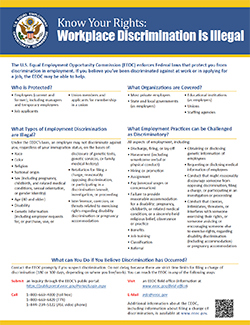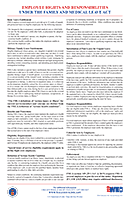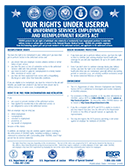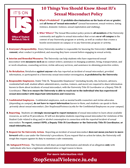Rights and Responsibilities
IU Employees and Applicants
Indiana University employees and applicants of positions have certain protections under Federal and State law as well as University policy. The information on this page is a useful guide for understanding your rights and responsibilities as they relate to employment laws, regulations and requirements.
 American Disabilities Act (ADA)
American Disabilities Act (ADA)
Summary: In compliance with the Americans with Disabilities Act (ADA) of 1990, an individual can request an accommodation to participate in an employment-related activity.
- Assistance: ADA Services
- Forms: Self Identification and Reasonable Accommodation
- Posters:
Clery Disclosure of Campus Security Policy and Campus Crime Statistics Act
Summary: This law requires colleges and universities across the United States to disclose information about crime on and around their campuses. Annual reports are available online by campus as listed on the web page below. You may also request a paper copy from a campus IUPD contact.
Conflicts of Interest and Commitment
Summary: It is the policy of Indiana University that conflicts of interest should be avoided where possible, or otherwise disclosed and managed. Employees have a responsibility to immediately disclose any real or potential conflicts of interest. It is also the policy of Indiana University that employees devote their university work activities to official functions of the university; use university resources only in the interest of the university; and, not allow external activities to impede the fulfillment of university responsibilities.
- Policy: Conflicts of Interest and Commitment
- Form: Disclosure Form
 Equal Opportunity/Affirmative Action
Equal Opportunity/Affirmative Action
Summary: Indiana University's statement prohibiting job discrimination.
- Policy: Non-Discrimination
- Web: Office of Civil Rights Compliance
- Contact: Office of Civil Rights Compliance
- Posters:
 Fair Labor Standards Act (FLSA)
Fair Labor Standards Act (FLSA)
Summary: The Fair Labor Standards Act (FLSA) is an employee protection act that establishes minimum wage, overtime pay, equal pay, and recordkeeping laws.
- Poster: "Minimum Wage"
 Family Medical Leave Act (FMLA)
Family Medical Leave Act (FMLA)
Summary: The FMLA of 1993 provides an entitlement of up to 12 weeks of job-protected, unpaid leave during a calendar year to eligible, covered employees for (1) birth and care of a child or placement for adoption/foster care of a child; (2) care of an immediate family member; or (3) care of the employee's own health condition.
- Policy: Family and Medical Leave Act (FMLA) Rights
- Poster: "Employee Rights and Responsibilities Under the FMLA"
 Genetic Information Nondiscrimination Act (GINA)
Genetic Information Nondiscrimination Act (GINA)
Summary: The Genetic Information Nondiscrimination Act (GINA) prohibits the use of genetic information in employment decision making; restricts employers from requesting, requiring, or purchasing genetic information; requires that genetic information be maintained as a confidential medical record; and places strict limits on disclosure of genetic information
- Policy: Guidelines for Compliance with the Genetic Information Nondiscrimination Act (GINA)
- Posters:
 Military Leaves for Employees
Military Leaves for Employees
Summary: The Uniformed Services Employment and Reemployment Rights Act (USERRA) establishes employee eligibility and job entitlements, employer obligations, benefits and remedies under the Act.
- Policy: Leaves for Military Duty and Leaves for Military Families
- Poster: "Your Rights Under USERRA"
 Sexual Misconduct
Sexual Misconduct
Summary: The federal law Title IX governs Indiana University’s response to sexual harassment and sexual violence. All employees of the university have an obligation to prevent and respond promptly to all forms of sexual misconduct. In compliance with Title IX, “Responsible Employees” are required to share information known to them about incidents of sexual misconduct.
- Policy: Discrimination, Harassment, and Sexual Misconduct
- Web: Stop Sexual Violence
- Contact: Title IX Coordinator or a Deputy Title IX Coordinator on campus
Substance-Free Workplace
Summary: In compliance with the Drug-Free Workplace Act of 1988 and the federal Drug-Free Schools and Communities Act Amendments of 1989. References the Controlled Substances Act, criminal penalties, and health risks.
- Policy: Substance-free Workplace
